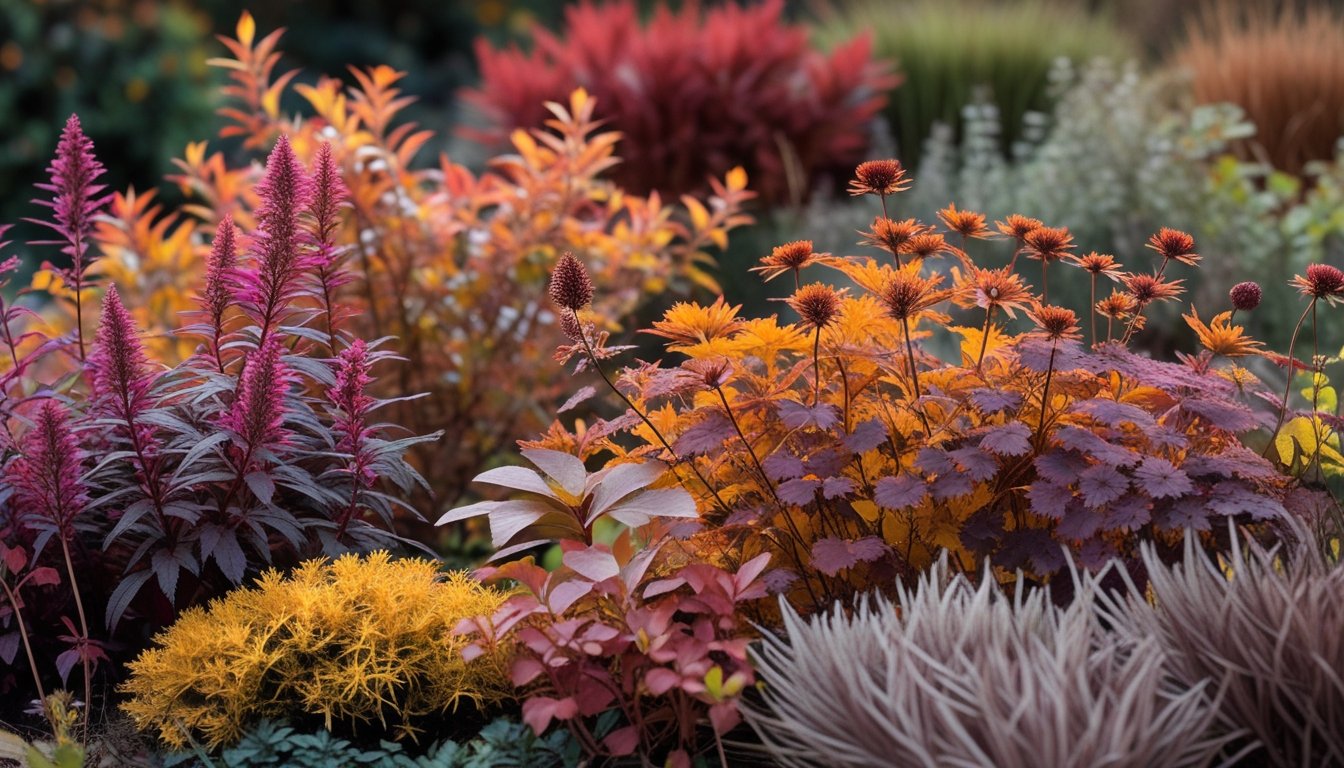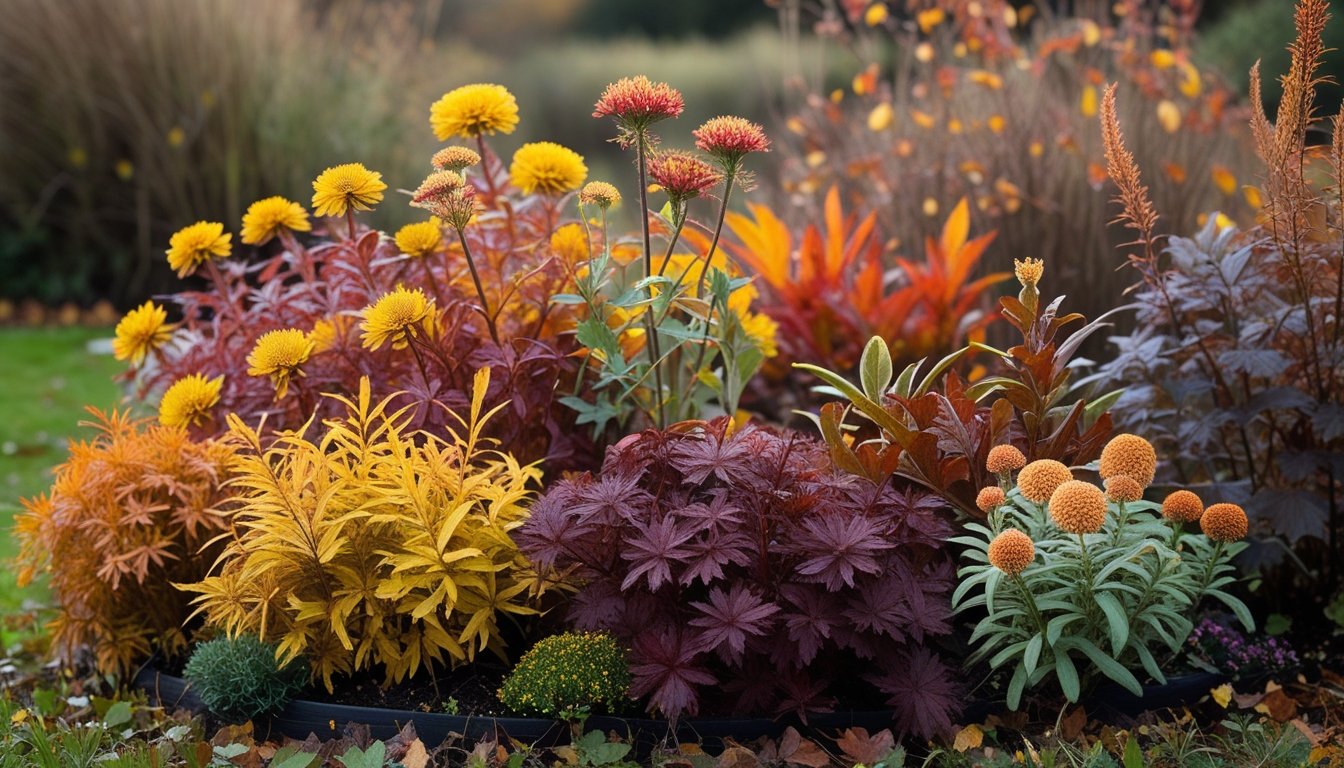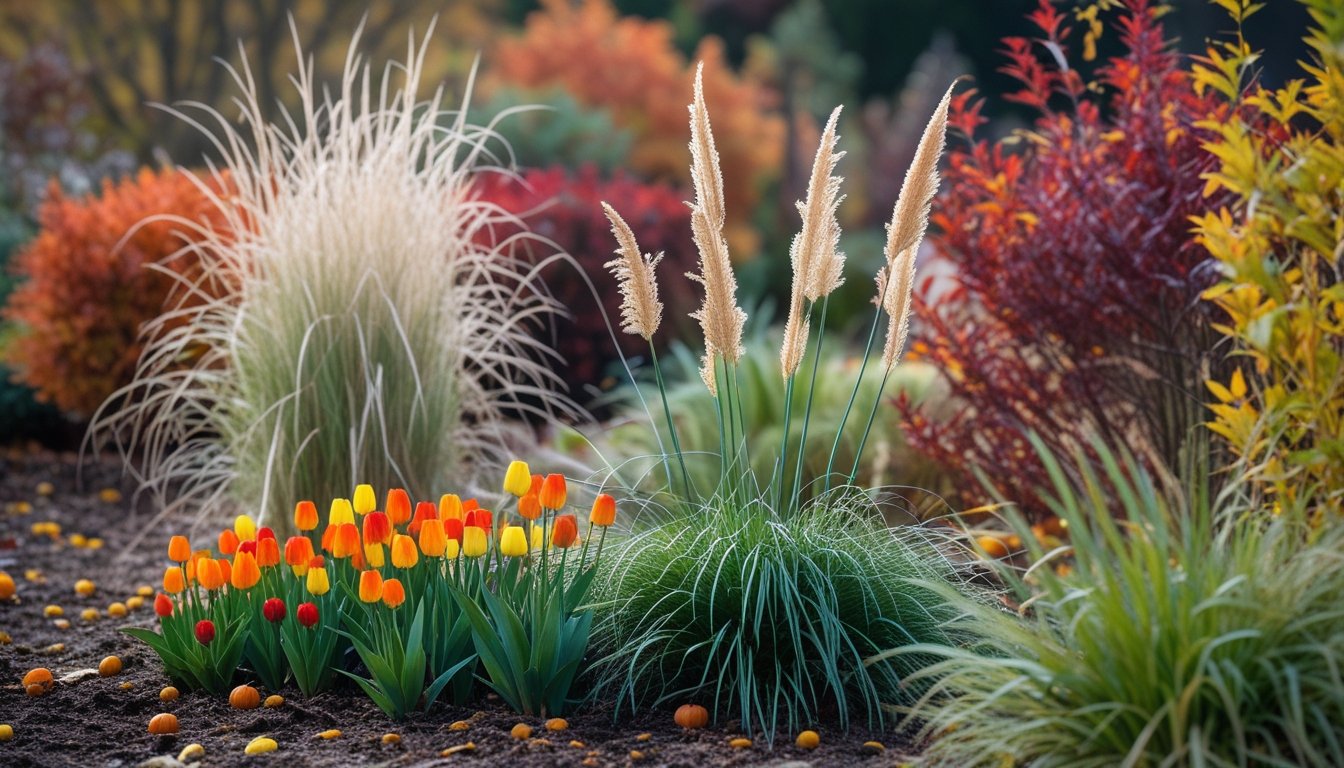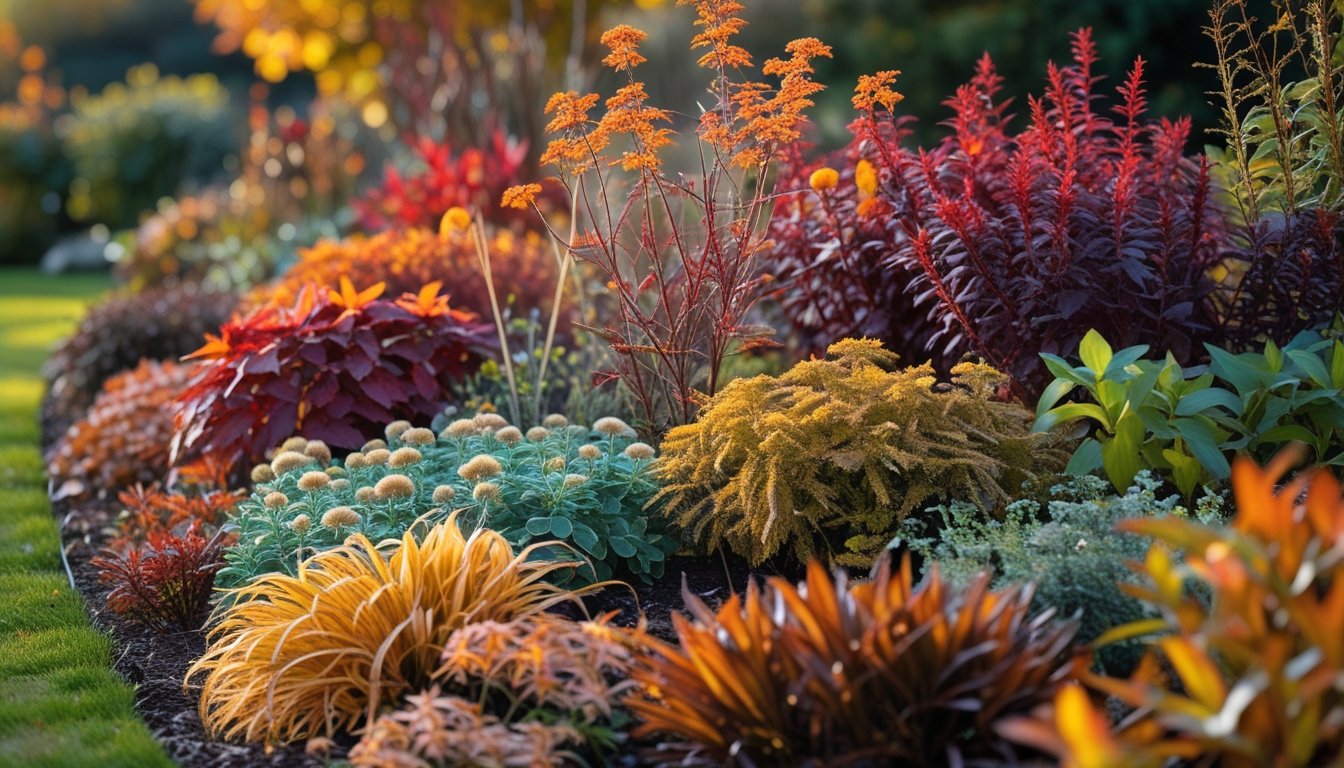Late updated: 08 Aug 2025 11:08
Written by: Emily Thornton
Native UK Perennials for Autumn Colours: Enhancing Your Garden's Seasonal Appeal
The transition from summer to autumn offers a remarkable opportunity to transform our gardens with native UK perennials that bring vibrant colour as the leaves start to fall. British perennials such as Molinia caerulea subsp. arundinacea provide not just structural beauty, but also an impressive autumnal hue that can enhance any garden space. By adding these plants that are well-adapted to our climate, we can effortlessly enrich our autumnal landscapes.

In addition to being environmentally friendly, native perennials support local biodiversity. Many of these plants have evolved alongside British wildlife and play a critical role in sustaining it. From fiery foliage to late-season blooms, choosing the right perennials can create a seamless transition of colour from summer into the cooler months.
Our gardens can be further heightened by complementing perennials with autumn-interest shrubs, bulbs, and grasses. A well-considered mix can extend the seasonal interest in the garden and provide valuable resources for wildlife. With this approach, we aim to craft a vibrant and dynamic garden that delights both the eye and the ecosystem.
Key Takeaways
- Select native UK perennials for vibrant autumn colours.
- Perennials can support local biodiversity effectively.
- Combine with shrubs, bulbs, and grasses for added interest.
Top Native UK Perennials for Autumn Colours

Autumn offers a spectacular display of colours with native UK perennials like asters, Japanese anemones, sedum, and chrysanthemums. These plants enliven gardens with their rich hues and resilience as temperatures drop.
Asters and Symphyotrichum Varieties
Asters and their relatives in the Symphyotrichum genus are prized for their vivid autumn blooms. These perennials present a palette of blues, purples, and pinks. Known for their daisy-like flowers, they thrive in well-drained soil with good sunlight. Michaelmas daisies are a popular choice, often blooming through October.
Their ability to transition smoothly from summer to autumn makes them valuable for garden continuity. Regular watering and deadheading help extend the flowering period. A diverse range of flower forms and sizes ensures they can fit into any garden aesthetic.
Japanese Anemones
Japanese anemones bring a touch of elegance to autumn gardens. These perennials produce flowers in shades of pink and white on tall, slender stems. They are particularly striking against the backdrop of fading summer plants. Preferring partial shade, they offer long-lasting blooms from late summer into autumn.
Japanese anemones are low-maintenance, making them ideal for busy gardeners. They require minimal care once established and have a reputation for spreading, which can provide natural garden coverage over time. Their standout beauty makes them an autumn favourite.
Sedum and Hylotelephium
Sedum, also known as stonecrop, along with its close kin Hylotelephium, offers a robust option for autumn colour. These succulents are renowned for their fleshy leaves and clustered flower heads. They flourish in sunny areas with poor, well-drained soils and are incredibly drought-tolerant.
These plants reveal their floral splendour late in the season, with vibrant hues from deep pink to red. Their geometric forms add a unique structural element to gardens, and they are a magnet for late-season pollinators. Care includes occasional pruning and dividing to prevent overcrowding.
Chrysanthemums
Chrysanthemums, or mums, are quintessential autumn bloomers. These perennials display a wide variety of flower shapes and vibrant colours like yellow, orange, red, and purple. They prefer a sunny spot with fertile, well-drained soil for optimal growth.
To maintain their floral display, water chrysanthemums regularly and remove spent blooms. Their popularity stems from their prolonged blooming period, which can last until the first frosts. Chrysanthemums offer not only beauty but also a link to autumn traditions, being associated with seasonal festivals and decorations in the UK.
Supporting Autumn Interest: Bulbs, Grasses, and Shrubs

In our exploration of enhancing autumn gardens, we focus on the vibrant contributions of bulbs, the structural elegance of grasses, and the dramatic foliage of shrubs. Each plays a crucial role in creating a rich tapestry of colours and textures that define the autumn landscape.
Autumn-Flowering Bulbs and Naked Ladies
Autumn-flowering bulbs bring a splash of unexpected colour when most plants fade. Among these, Colchicum, commonly known as "naked ladies," stands out due to its leafless flowering habit. Cyclamen hederifolium adds a subtle charm with its delicate flowers and marbled leaves.
For a bolder statement, Nerine bowdenii offers striking pink blooms, providing brightness as other flowers retreat. Sternbergia lutea, with its cheerful yellow flowers, is perfect for borders, thriving in well-drained soil. Crocus sativus, the saffron crocus, not only offers aesthetic appeal with its vibrant blooms but also the opportunity to harvest valuable saffron.
Ornamental and Native UK Grasses
Grasses carry an elegant simplicity that enhances autumn gardens. Their graceful, arching forms and subtle movement add a dynamic element. Liriope muscari, a robust choice, offers year-round interest and deep green foliage that turns purple in colder months. Its spikes of purple flowers appear in autumn, adding to its appeal.
Within native species, Molinia caerulea or purple moor grass provides striking tufts of bluish-purple flowers and golden autumnal foliage. Calamagrostis acutiflora, a commanding ornamental grass, exhibits a tall, slender form ideal for creating vertical accents. Both varieties enhance texture and movement, capturing the essence of the autumn breeze.
Shrubs with Notable Autumn Foliage
Shrubs hold their own in autumn with colourful foliage that provides a spectacular backdrop. Cornus sanguinea, known for its flame-red stems and leaves, brings a bold splash of colour as temperatures cool. This shrub thrives in moist conditions, making it a versatile choice.
Viburnum opulus, or guelder rose, offers clusters of bright red berries and lush leaves that turn a vibrant scarlet. Its presence attracts wildlife, enhancing the biodiversity of our gardens. Cotinus coggygria or smoke bush also deserves a place for its dramatic foliage that shifts from green to deep red and orange.
Additional Hardy Perennials
We round out our selection with hardy perennials that continue to offer interest as autumn progresses. Sedum spectabile, with its fleshy leaves and pink clusters, provides a haven for pollinators. Echinacea purpurea, although a traditional summer flower, extends into autumn with attractive seed heads.
Dahlias are another perennial that, with proper planting and care, contribute an array of vibrant colours well into the autumn months. Their bold flowers captivate any garden space. Combining these perennials with autumn-flowering bulbs and grasses ensures a diverse, engaging garden environment that remains lively until the winter frost sets in.
Frequently Asked Questions

In this section, we address common queries about native UK perennials that bring striking colours to autumn gardens, focus on low-maintenance options, and discuss shrubs suitable for the climate. We also explore perennial plants offering year-round blooms and recommend specific autumn-flowering bulbs for UK gardens.
Which native perennials are known for providing vivid autumn colours in the UK?
Molinia caerulea, a grass native to UK moorlands, offers a delicate structure with golden hues in autumn. Another splendid choice is the common knapweed, which sports vibrant purple flowers and is beneficial for pollinators.
What are some low-maintenance UK native perennials that bloom in autumn?
For those seeking ease of care, consider the foxglove or digitalis purpurea, known for its tall, striking spires. Bellflower or Campanula also provides robust blooming with little maintenance required.
Can you suggest some autumn-flowering shrubs that are well-suited to UK climates?
Dogwood is an excellent shrub, providing deep red leaves and vibrant winter stems. Another reliable option is the spindle, which offers colourful berries and vivid leaves through the colder months.
Which perennial plants will offer both autumn and winter interest in a UK garden?
Hellebores are perfect, with evergreen foliage and winter blooms. Additionally, the sedum or stonecrop retains its form through autumn and can persist into winter, providing structure and texture.
Which outdoor plants native to the UK bloom throughout the year, including autumn?
Primroses can bloom multiple times a year under mild conditions. Wild marjoram can persist from late summer into the autumn months, offering continuous interest and colour.
What varieties of autumn-flowering bulbs are recommended for UK gardens?
Consider planting autumn crocus, which brings a delicate purple bloom as the season turns. Cyclamen hederifolium is another choice, thriving in shady spots and displaying charming flowers throughout autumn.
